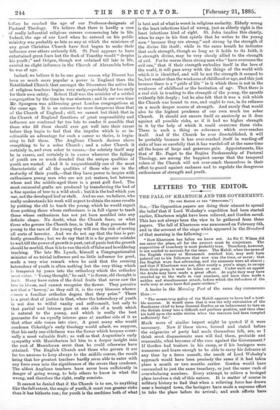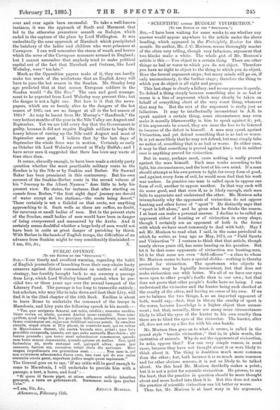LETTERS TO THE EDITOR.
THE FALL OF KHARTOUM AND THE GOVERNMENT.
(TO THE EDITOR OF THE " SPECTATOR."]
51'4—The Opposition papers are doing their utmost to spread the belief that if Lord Wolseley's expedition had been started earlier, Khartoum might have been relieved, and Gordon saved.
This has not always been the. view to be gathered from these papers. The fall of Khartoum was announced on February 6th,
and in the account of the siege which appeared in the Standard of that morning is the following —
" Row Khartoum has fallen we know not. As Sir C. Wilson did not enter the place, all for the present must be conjecture. The supposition of treachery is most probably true. Treachery, however, is not needed to account for the issue. The Mandi, when the news of the English victory at Metammeh reached him, may well have pointed out to his followers that now was the time, or never; that the English were fast advancing, and the steamers were all absent ; and that if Khartoum was not, after nearly a year's siege, to escape from their grasp, it must be taken at once. Under such an appeal the Arabs may have made a great effort. At night they may have crawled up to the walls in vast numbers, and have then made a sudden and simultaneous attack, before which the defenders of the walls may at once have fled panic-striken."
A leader in the Morning Post of the same day commences thus
The mouse-trap policy of the Mandi appears to have had a terrible success. It would seem that it was the wily calculation of the Soudanese chief to keep General Gordon as an inducement to lure on the British Army into a difficult and perilous position, and thee close his hold upon the noble victim when the rescuers had been tempted sufficiently far."
Mach more of similar import might be quoted if it were necessary. Now if these views, formed and stated before the exigencies of party had made themselves felt, are, as I think most dispassionate men will find them, probable and reasonable, what becomes of the case against the Government If Gordon had traitors in his camp, or if his besiegers were numerous and brave enough to be able to carry his defences at any time by a fierce assault, the result of Lord Wolseley's approach would have been precisely the same if it had taken place a month or two months earlier. Gordon would have succumbed to just the same treachery, or just the same rush of overwhelming numbers. Every attempt to relieve a besieged place involves a risk of this nature. It is matter of coarse in military history to find that when a relieving force has drawn near a besieged town, the besiegers have made a supreme effort to take the place before its arrival ; and such efforts have
over and over again been successful. To take a well-known instance, it was the approach of Soult and Marmont that led to the otherwise premature assault on Badajos, which ended in the capture of the place by Lord Wellington. It was undoubtedly the near approach of Havelock which precipitated the butchery of the ladies and children who were prisoners at Cawnpore. I can well remember the storm of wrath and horror which the news of the Cawnpore massacre aroused in England ; but I cannot remember that anybody tried to make political capital out of the fact that Havelock and Outram, like Lord Wolseley, were " too late."
Much as the Opposition papers make of it, they can hardly make too much of the misfortune that an English Army will have to pass the hot season in the Soudan. Mr. Stanley long ago predicted that at that season European soldiers in the Soudan would " die like flies." The care and good management to be expected from Lord Wolseley may prevent this ; but the danger is not a light one. But how is it that the newspapers, which are so keenly alive to the dangers of the hot season of 1881, can see no danger at all in the hot season of 1884? As may be learnt from Mr. Murray's "Handbook," the very hottest months of the year in the Nile Valley are August and September. Yet we are told every day that the Government-isguilty, because it did not require English soldiers to begin the heavy labour of rowing up the Nile until August and most of September were past. I believe that by the last days of September the whole force was in motion. Certainly as early as October 4th Lord Wolseley arrived at Wady Halfah ; and I have never seen it suggested that there has been any waste of time since then.
It seems, absurdly enough, to have been made a strictly party question whether the most practicable military route to the Soudan is by the Nile or by Suakim and Berber. Sir Samuel Baker has been prominent in this controversy. But his own account of the Suakim-Berber route in the second volume of his "Journey to the Albert Nyanza" does little to help his present view. He states, for instance, that after starting on camels from Berber, " the first eight days' journey are devoid of water except at two stations,—the route being desert." There certainly is not a Gakdul on that route, nor anything approaching to it. Such wells as there are suffice, no doubt, for caravans or small bodies of men. But in the present state of the Soudan, small bodies of men would have been in danger of being overpowered and massacred by the Arabs. And it certainly seems doubtful whether a large body of men would not have been in quite as great danger of perishing by thirst. With Berber in the hands of English troops, the difficulties of an advance from Suakim might be very considerably diminished, I am, Sir, &c., X.



































 Previous page
Previous page